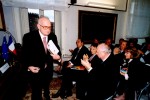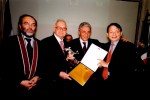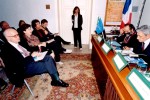MAMT||Museo Mediterraneo dell' Arte, della Musica e delle Tradizioni (EN)
|
07 September 2022
Iniziative (EN) -
MAMT – Mediterranean Museum of Art, Music and Traditions
 Marcello Piazza was a brotherly, dear friend. We remembered him today in the premises of the Peace Museum - MAMT one month after his death on 6 September.
Marcello Piazza was a brotherly, dear friend. We remembered him today in the premises of the Peace Museum - MAMT one month after his death on 6 September.
Our long acquaintance on the most disparate topics - from art to politics, from health to current affairs - began in the early 1990s when fate would have it that his studio and my home in Naples were in the same building, one above the other.
There are so many memories, such as that of May 2004 when we awarded him with our Foundation the "Mediterranean Award for Science"; the many dinners with his dear wife; his enormous sorrow at being unable to help my wife Rita, who was very dear to him; and the stories...
He loved telling and retelling, Marcello.
He smiled when I reminded him of the conversation between my father Raffaele and Carlo D'Amato, the mayor of Naples at the time. It was 1985 and before being received by Mayor D'Amato, Marcello stopped to talk to those present and to journalists. The cases of Hepatitis B that year had grown out of all proportion, with a trial of mussels and anchovies which, it had been discovered, contained a deadly worm: anisakis. The newspapers were full of it and the scaremongers were not fazed. "It's all nonsense, - Marcello began, and his simple, down-to-earth talk struck a chord with everyone - the reasons for the proliferation of the disease are other. The dirt, the filth? But did you know that nature created skin and hair grease to protect us? It is scientifically proven that the use of certain soaps alters the pH of the skin, which is therefore more defenceless against pathogenic attacks. In short, if you wash yourself and throw yourself into a polluted sea, you are more likely to get skin fungus...".
He was a revolutionary in his way of thinking Marcello, defined by everyone as the "father of infectivology", but he was something more. He was the researcher who, with stubbornness and study, discovered the reasons for the spread of Hepatitis B, a disease that was practically common to 90 per cent of Neapolitans in the 1970s but which fortunately did not "explode" in everyone. Marcello saved many lives, perhaps it is no exaggeration to say thousands.
His most important undertaking was the so-called "Piazza Scheme", which he never tired of explaining to me in detail: it consisted in the need to vaccinate all newborns against hepatitis. His argument convinced the government, which in 1991 enacted a law on compulsory vaccination against hepatitis. Since then, the disease has been almost completely eradicated.
"A life, a great love" is the title of the 2020 book in which Marcello told his story in a thousand episodes, from the "rescue" of the footballer Alemao, to colleagues who did not want to vaccinate. Up to the indictment of the pharmaceutical companies guilty of boycotting the therapy he developed against hepatitis C "for commercial interests".
The same thing is happening today with the Covid-19 vaccines.
I treasure the book with his dedication. Thank you Marcello.
This is President Capasso's remembrance.




